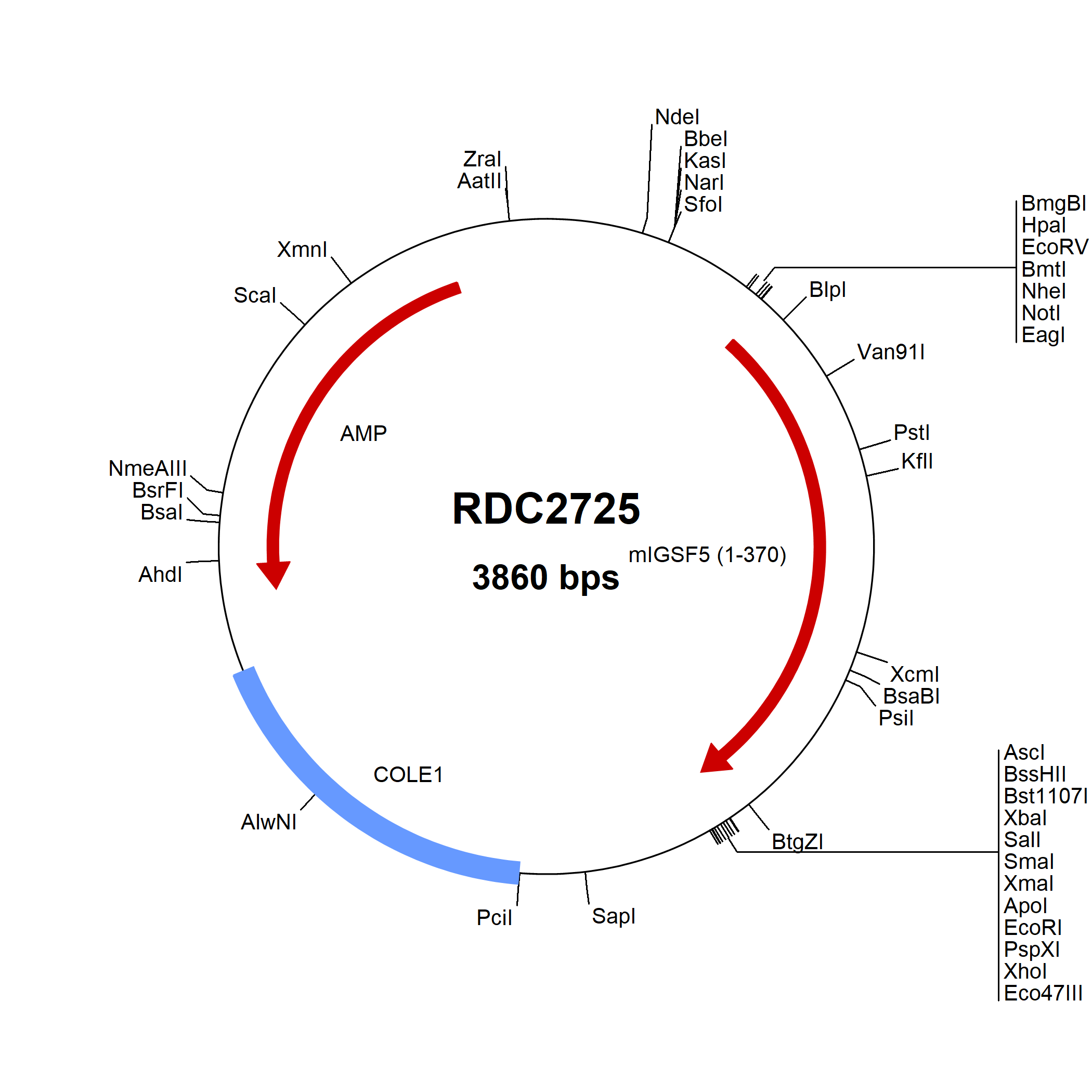JAM-4/IGSF5 Products
Members of the junctional adhesion molecule (JAM) family are type I transmembrane glycoproteins of the immunoglobulin (Ig) superfamily that are localized in the tight junctions between endothelial or epithelial cells and appear to be involved in leukocyte transmigration. JAM-A, also known as platelet adhesion molecule 1 (PAM-1) and platelet F11 receptor, contains two V-type Ig-like domains, forms homodimers, and interacts with LFA-1. JAM-B (vasculoendothelial or VE-JAM) and JAM-C each contain two Ig domains (one V-type and one C2-type), a cytoplasmic PDZ-binding motif and a PKC phosphorylation site. JAM-C interacts with MAC-1 and facilitates JAM-B interaction with integrin alpha 4 beta 1.
59 results for "JAM-4/IGSF5" in Products
59 results for "JAM-4/IGSF5" in Products
JAM-4/IGSF5 Products
Members of the junctional adhesion molecule (JAM) family are type I transmembrane glycoproteins of the immunoglobulin (Ig) superfamily that are localized in the tight junctions between endothelial or epithelial cells and appear to be involved in leukocyte transmigration. JAM-A, also known as platelet adhesion molecule 1 (PAM-1) and platelet F11 receptor, contains two V-type Ig-like domains, forms homodimers, and interacts with LFA-1. JAM-B (vasculoendothelial or VE-JAM) and JAM-C each contain two Ig domains (one V-type and one C2-type), a cytoplasmic PDZ-binding motif and a PKC phosphorylation site. JAM-C interacts with MAC-1 and facilitates JAM-B interaction with integrin alpha 4 beta 1.
| Reactivity: | Mouse |
| Details: | Sheep IgG Polyclonal |
| Applications: | WB |
| Reactivity: | Mouse |
| Details: | Sheep IgG Polyclonal |
| Applications: | WB |
| Reactivity: | Human |
| Details: | Rabbit IgG Polyclonal |
| Applications: | WB |
| Reactivity: | Human |
| Details: | Rabbit IgG Polyclonal |
| Applications: | IHC |
| Reactivity: | Mouse |
| Details: | Rabbit IgG Polyclonal |
| Applications: | IHC |
| Applications: | AC |
| Reactivity: | Human |
| Details: | Rabbit IgG Polyclonal |
| Applications: | WB |
| Reactivity: | Mouse |
| Details: | Rabbit IgG Polyclonal |
| Applications: | IHC |
| Reactivity: | Mouse |
| Details: | Rabbit IgG Polyclonal |
| Applications: | IHC |
| Reactivity: | Mouse |
| Details: | Rabbit IgG Polyclonal |
| Applications: | IHC |
| Reactivity: | Mouse |
| Details: | Rabbit IgG Polyclonal |
| Applications: | IHC |
| Reactivity: | Mouse |
| Details: | Rabbit IgG Polyclonal |
| Applications: | IHC |
| Reactivity: | Human |
| Details: | Rabbit IgG Polyclonal |
| Applications: | WB |
| Reactivity: | Mouse |
| Details: | Rabbit IgG Polyclonal |
| Applications: | IHC |
| Reactivity: | Mouse |
| Details: | Rabbit IgG Polyclonal |
| Applications: | IHC |
| Reactivity: | Mouse |
| Details: | Rabbit IgG Polyclonal |
| Applications: | IHC |
| Reactivity: | Mouse |
| Details: | Rabbit IgG Polyclonal |
| Applications: | IHC |
| Reactivity: | Mouse |
| Details: | Rabbit IgG Polyclonal |
| Applications: | IHC |
| Reactivity: | Mouse |
| Details: | Rabbit IgG Polyclonal |
| Applications: | IHC |
| Reactivity: | Mouse |
| Details: | Rabbit IgG Polyclonal |
| Applications: | IHC |
| Reactivity: | Mouse |
| Details: | Rabbit IgG Polyclonal |
| Applications: | IHC |
| Reactivity: | Human |
| Details: | Rabbit IgG Polyclonal |
| Applications: | WB |
| Reactivity: | Human |
| Details: | Rabbit IgG Polyclonal |
| Applications: | WB |



![Western Blot: JAM-4/IGSF5 Antibody [NBP2-98912] Western Blot: JAM-4/IGSF5 Antibody [NBP2-98912]](https://resources.bio-techne.com/images/products/JAM-4-IGSF5-Antibody-Western-Blot-NBP2-98912-img0001.jpg)
![Immunohistochemistry-Paraffin: JAM-4/IGSF5 Antibody [NBP2-34155] Immunohistochemistry-Paraffin: JAM-4/IGSF5 Antibody [NBP2-34155]](https://resources.bio-techne.com/images/products/JAM-4-IGSF5-Antibody-Immunohistochemistry-Paraffin-NBP2-34155-img0004.jpg)
![Immunohistochemistry-Paraffin: JAM-4/IGSF5 Antibody [NBP2-99581] Immunohistochemistry-Paraffin: JAM-4/IGSF5 Antibody [NBP2-99581]](https://resources.bio-techne.com/images/products/JAM-4-IGSF5-Antibody-Immunohistochemistry-Paraffin-NBP2-99581-img0001.jpg)
